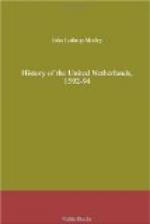In the same paper in which the demand was made Philip was urged to declare himself king of France. He was assured that the measure could be accomplished “by freely bestowing marquisates, baronies, and peerages, in order to content the avarice and ambition of many persons, without at the same time dissipating the greatness from which all these members depended. Pepin and Charlemagne,” said the memorialists, “who were foreigners and Saxons by nation, did as much in order to get possession of a kingdom to which they had no other right except that which they acquired there by their prudence and force, and after them Hugh Capet, much inferior to them in force and authority, following their example, had the same good fortune for himself and his posterity, and one which still endures.
“If the authority of the holy see could support the scheme at the same time,” continued Mayenne and friends, “it would be a great help. But it being perilous to ask for that assistance before striking the blow, it would be better to obtain it after the execution.”
That these wholesome opinions were not entirely original on the part of Mayenne, nor produced spontaneously, was plain from the secret instructions given by Philip to his envoys, Don Bernardino de Mendoza, John Baptist de Tassis, and the commander Moreo, whom he had sent soon after the death of Henry III. to confer with Cardinal Gaetano in Paris.
They were told, of course, to do everything in their power to prevent the election of the Prince of Bearne, “being as he was a heretic, obstinate and confirmed, who had sucked heresy with his mother’s milk.” The legate was warned that “if the Bearnese should make a show of converting himself, it would be frigid and fabricated.”
If they were asked whom Philip desired for king—a question which certainly seemed probable under the circumstances—they were to reply that his foremost wish was to establish the Catholic religion in the kingdom, and that whatever was most conducive to that end would be most agreeable to him. “As it is however desirable, in order to arrange matters, that you should be informed of everything,” said his Majesty, “it is proper that you should know that I have two kinds of right to all that there is over there. Firstly, because the crown of France has been usurped from me, my ancestors having been unjustly excluded by foreign occupation of it; and secondly, because I claim the same crown as first male of the house of Valois.”
Here certainly were comprehensive pretensions, and it was obvious that the king’s desire for the establishment of the Catholic religion must have been very lively to enable him to invent or accept such astonishing fictions.
But his own claims were but a portion of the case. His daughter and possible spouse had rights of her own, hard, in his opinion, to be gainsaid. “Over and above all this,” said Philip, “my eldest daughter, the Infanta, has two other rights; one to all the states which as dower-property are joined by matrimony and through females to this crown, which now come to her in direct line, and the other to the crown itself, which belongs directly to the said Infanta, the matter of the Salic law being a mere invention.”




